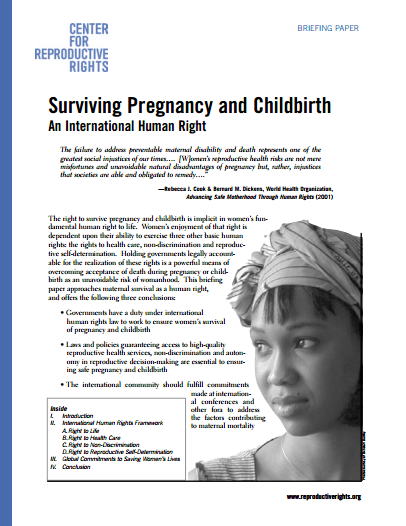Pregnant Women in Nigeria Die Due to Government Negligence, According to Center for Reproductive Rights’ New Report
Almost 60,000 women die every year in Nigeria from preventable pregnancy-related causes because the oil-rich country has failed to implement and enforce its own policies on maternal health, according to a new report published by the New York-based Center for Reproductive Rights and the Women Advocates Research and Documentation Centre (WARDC) in Lagos, Nigeria.
Broken Promises: Human Rights, Accountability and Maternal Death in Nigeria examines the reasons why so many women in the country die during pregnancy and childbirth. Nigeria has one of the highest numbers of pregnancy-related deaths in the world, ranking second only to India. The Center report found that despite being one of Africa’s biggest oil exporters and the government adopting a number of policies that would be effective in addressing this problem, Nigeria fails to adequately regulate or fund its healthcare system.
“Good policies are meaningless if there are no laws to enforce them or money to implement them,” said Onyema Afulukwe, a visiting lawyer at the Center for Reproductive Rights and one of the report’s authors. “This is not a problem of resources or culture, but a failure of political will.”
On Thursday, July 3, Nigeria’s track record on women’s human rights will be reviewed by the United Nations committee that monitors governments’ compliance with the Convention on the Elimination of All Forms of Discrimination against Women (CEDAW). Maternal mortality will be one of the issues the CEDAW Committee will bring up with government delegates from Nigeria. The Committee will issue its conclusions after its session has concluded on July 18.
The Center’s report found that the lack of financial and political commitment from the government has created a number of significant barriers for pregnant women seeking maternity care:
- Pregnant women seeking obstetric care in public hospitals must bring their husbands to donate blood. If the husband refuses or if the woman doesn’t have a husband, she is refused care.
- Women in labor are forced to travel to hospitals on motorbikes.
- Public health facilities demand in exchange for care that pregnant women purchase basic necessities like antiseptics, syringes and gauze and that these items be a specific brand name.
- Doctors keep flashlights handy in the delivery room for use during regular power outages because health centers are not equipped with alternative sources of power.
Nigeria has created health policies that call for equitable access to reproductive healthcare, training for healthcare providers in reproductive health, and improved access to family planning. But despite pledging to give 15% of its annual budget to the health sector, the government only allocated slightly over 5% in 2008. Almost all maternal deaths could be easily prevented for $3 per person per year.
“Other countries with fewer resources than Nigeria have been able to drastically reduce the number of pregnant women dying needlessly,” said Luisa Cabal, Director of the Center’s International Legal Program. “Nigeria has an obligation under human rights law to protect and guarantee every woman’s right to safe pregnancy and childbirth. It has no excuse for failing to live up to its commitments.”
The report’s finding are based on interviews conducted in Nigeria with over 60 people, including pregnant women, women who had been affected by the poor state of maternal health care, medical practitioners, government officials and advocacy groups. Policies, legislation and research literature were also analyzed.
,
,

